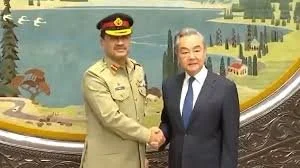Visits of Dar, COAS to US, China counter Indian isolation efforts
As Foreign Minister Ishaq Dar secures US praise for regional peace efforts and Army Chief Asim Munir reinforces defence ties with China, Pakistan signals robust global partnerships despite Indian efforts to diplomatically isolate it
STATE OF THE NATION
July 25, 2025
DESPITE concerted efforts by India’s Narendra Modi-led government to isolate Pakistan following April’s terrorist attack in Occupied Kashmir, which left over 20 tourists dead, Islamabad’s relations with global powers appear to be strengthening. Two high-profile visits by Pakistani officials this week underscored this resilience: Foreign Minister Ishaq Dar’s engagements in Washington and Army Chief Field Marshal Syed Asim Munir’s strategic talks in Beijing.
Foreign Minister Ishaq Dar’s eight-day visit to the US also featured a pivotal meeting with Secretary of State Marco Rubio, who played a key role in brokering a ceasefire between Pakistan and India after their four-day military standoff in May. According to Pakistan’s Foreign Office (FO), Rubio lauded Islamabad’s contributions to “global and regional peace” — a significant diplomatic win given India’s persistent attempts to paint Pakistan as a state sponsor of terrorism.
Rubio’s acknowledgment of Pakistan’s “everlasting sacrifices in the war on terror” struck a chord in Islamabad, countering New Delhi’s long-standing narrative. The FO noted that discussions spanned trade, investment, agriculture, technology, and minerals, with both sides expressing optimism about expanding economic ties. Dar also commended US leadership for its role in de-escalating recent Pakistan-India tensions, calling Washington’s efforts “commendable”.
“Pakistan and the US seek further expansion and stability in bilateral relations,” Dar affirmed, highlighting the Pakistani diaspora’s role as a bridge between the two nations.
Foreign Minister Ishaq Dar and Secretary Marco Rubio shake hands just before their meeting.
China-Pakistan defence ties
Army Chief Asim Munir’s visit to China reinforced the ironclad defence partnership between the two allies. According to Dawn, Chinese military leaders expressed “full confidence” in Pakistan’s role as a stabilising force in South Asia. Meetings with Vice President Han Zheng and Foreign Minister Wang Yi focused on the China-Pakistan Economic Corridor (CPEC), counterterrorism, and regional security.
The Inter-Services Public Relations (ISPR) stated that both sides agreed to deepen defence collaboration, including joint training, modernisation, and countering hybrid threats. Munir’s reception at the People’s Liberation Army Headquarters —complete with a guard of honour — symbolised the enduring military camaraderie.
China’s leadership praised Pakistan’s armed forces as a “cornerstone of resilience”, while Gen Munir reaffirmed Islamabad’s commitment to expanding military cooperation. The visit, the ISPR noted, reflects the “growing depth of politico-military ties” between the two nations.
Economic and strategic gains
The diplomatic momentum was further bolstered by a new shipping agreement between Pakistan National Shipping Corporation and China’s Shandong Xinxu Group, set to transform maritime logistics. Earlier, Dar and Chinese Foreign Minister Wang Yi had already pledged to enhance bilateral cooperation, signalling a multi-faceted partnership.
As India continues its campaign to sideline Pakistan on the global stage, Islamabad’s proactive engagements with Washington and Beijing demonstrate its ability to sustain — and even strengthen — key alliances. With high-level dialogues yielding tangible economic and security benefits, Pakistan’s diplomatic counteroffensive appears to be paying off.
For now, the message is clear — isolation is nowhere to be seen.

